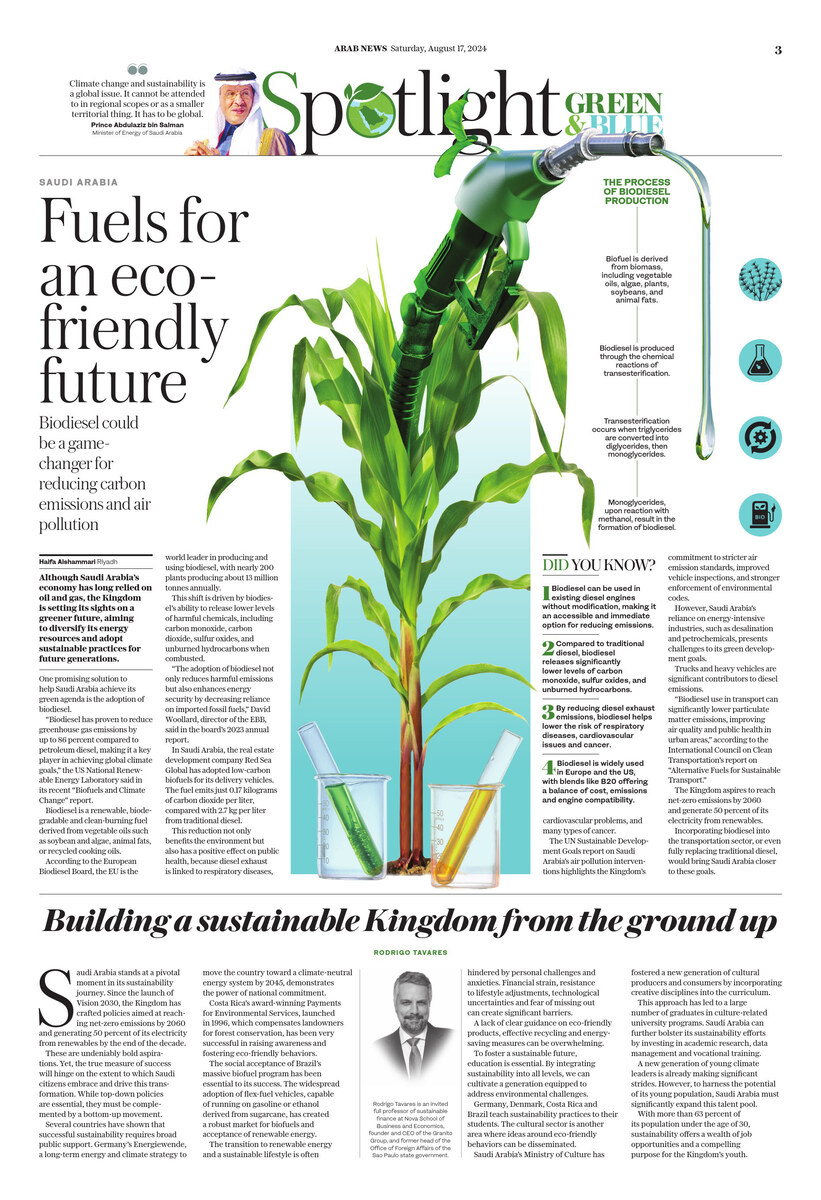RIYADH: Although Saudi Arabia’s economy has long relied on oil and gas, the Kingdom is setting its sights on a greener future, aiming to diversify its energy resources and adopt sustainable practices for future generations.
One promising solution to help Saudi Arabia achieve its green agenda is the adoption of biodiesel — an alternative fuel that could significantly improve air quality and help combat climate change.
“Biodiesel has proven to reduce greenhouse gas emissions by up to 86 percent compared to petroleum diesel, making it a key player in achieving global climate goals,” the US National Renewable Energy Laboratory said in its recent “Biofuels and Climate Change” report.

By converting tallow, used cooking oil, and corn oil into biodiesel, between 79 percent and 86 percent of greenhouse gas reductions can be achieved compared with petroleum diesel. (Shutterstock)
Biodiesel is a renewable, biodegradable and clean-burning fuel derived from vegetable oils such as soybean and algae, animal fats, or recycled cooking oils. It has gained traction in Europe and the US as a sustainable alternative to petroleum-based diesel, offering a viable path to cutting carbon emissions.
According to the European Biodiesel Board, the EU is the world leader in producing and using biodiesel, with nearly 200 plants producing about 13 million tonnes annually.
This shift is driven by biodiesel’s ability to release lower levels of harmful chemicals, including carbon monoxide, carbon dioxide, sulfur oxides, and unburned hydrocarbons when combusted, making it a more environmentally friendly option.
“The adoption of biodiesel not only reduces harmful emissions but also enhances energy security by decreasing reliance on imported fossil fuels,” David Woollard, director of the EBB, said in the board’s 2023 annual report.
In Saudi Arabia, the real estate development company Red Sea Global has taken a pioneering step by adopting low-carbon biofuels for its delivery vehicles. The biofuel used by RSG emits just 0.17 kilograms of carbon dioxide per liter, compared with 2.7 kg per liter from traditional diesel.
This significant reduction in emissions not only benefits the environment but also has a positive effect on public health, because diesel exhaust is linked to respiratory diseases, cardiovascular problems, and many types of cancer.
By adopting biodiesel, Saudi Arabia could set a new standard for green development, playing a crucial role in balancing air pollution and mitigating climate change in the region.
The UN Sustainable Development Goals report on Saudi Arabia’s air pollution interventions highlights the Kingdom’s commitment to stricter air emission standards, improved vehicle inspections, and stronger enforcement of environmental codes.
DID YOUKNOW?
• Biodiesel is a renewable, biodegradable fuel made from vegetable oils, animal fats, or recycled cooking oils
• Compared to traditional diesel, biodiesel releases significantly lower levels of carbon monoxide, sulfur oxides, and unburned hydrocarbons.
• By reducing diesel exhaust emissions, biodiesel helps lower the risk of respiratory diseases, cardiovascular issues and cancer.
• Biodiesel is widely used in Europe and the US, with blends like B20 offering a balance of cost, emissions and engine compatibility.
However, Saudi Arabia’s reliance on energy-intensive industries, such as desalination and petrochemicals, presents challenges to its green development goals.
Trucks and heavy vehicles are significant contributors to diesel emissions, making the widespread adoption of biodiesel critical to reducing air pollution and achieving the Vision 2030 sustainable development targets.
“Biodiesel use in transport can significantly lower particulate matter emissions, improving air quality and public health in urban areas,” according to the International Council on Clean Transportation’s report on “Alternative Fuels for Sustainable Transport.”

For Saudi Arabia, incorporating biodiesel into its energy mix could be a significant step toward meeting its commitments under the Paris Agreement on climate change. (Shutterstock)
Globally, many countries are transitioning from conventional diesel to biodiesel blends to address the growing climate crisis.
In the US, for instance, B20 — a blend of 20 percent biodiesel and 80 percent traditional diesel — has become a popular choice due to its balance of cost, reduced emissions and compatibility with existing engines.
According to the US Department of Energy, B20 can reduce particulate matter emissions and greenhouse gases, as the carbon dioxide released during combustion is offset by the carbon dioxide absorbed by the plants used to produce biodiesel
Opinion
This section contains relevant reference points, placed in (Opinion field)
For Saudi Arabia, incorporating biodiesel into its energy mix could be a significant step toward meeting its commitments under the Paris Agreement on climate change. The Kingdom aspires to reach net-zero emissions by 2060 and reduce its greenhouse gas emissions by generating 50 percent of its electricity from renewable sources.
Incorporating biodiesel into the transportation sector, or even fully replacing traditional diesel, would bring Saudi Arabia closer to these goals and demonstrate its commitment to protecting the environment.
As the Kingdom continues to diversify its energy mix and modernize its industries, the adoption of biodiesel is likely to be a key component of its strategic planning for a sustainable future.



































